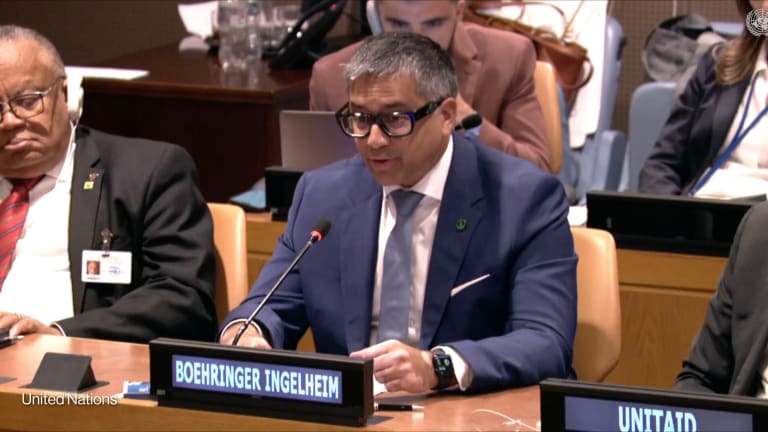
When heads of state meet this month for the United Nations high-level meeting on noncommunicable diseases, the challenges may appear daunting. But the opportunities are greater.
The burden of conditions that once dominated the global health agenda — infectious diseases such as tuberculosis, malaria, HIV/AIDS, and smallpox — is now subsiding: A century of research, innovation, public health commitment, and increased awareness and access to care have changed the trajectory of these diseases. Polio is nearly eradicated. Hepatitis C can now be cured with antiviral medications. And, in a few decades’ time, HIV/AIDS has gone from a lethal plague to a manageable condition.
Now, it’s time to address a new crisis: noncommunicable diseases.
Rather than leaving action to future generations, leaders can commit now to prioritizing early diagnosis and treatment, expanding access to integrated care, and tackling rising rates of cardio-kidney-metabolic conditions.
A growing crisis
Today, the number one driver of disease is no longer infection — it’s aging.
As life expectancies increase, so does the risk of living with a noncommunicable disease, or NCD. Cumulatively, NCDs, such as cancers, asthma, obesity, hypertension, dyslipidemia, diabetes, or kidney and cardiovascular disease, now represent 75% of deaths worldwide. More sedentary lifestyles, urbanization, changes in diet, and environmental factors have all contributed to this rapid increase in NCDs, which are now responsible for more than half of the global burden of disease.
These conditions don’t just affect patients — they strain health care systems and entire economies. Between an increased demand for health services, expensive treatments, and reduced workforce participation, NCDs drain the global economy trillions of dollars. In Europe alone, productivity losses from NCD-related deaths are estimated at over $514.5 billion each year.
Nevertheless, NCDs remain one of the most underfunded areas in global health.
If we continue waiting to diagnose and treat these conditions in their advanced stages, our health care systems will be overwhelmed. The costs will bankrupt both patients and governments.
Instead, we should adopt a two-prong strategy: prioritize the early diagnosis and treatment of interconnected cardio-kidney-metabolic, or CKM, conditions, and invest in the community-focused primary health care that will set patients — and broader health systems — up for success.
Cardio-kidney-metabolic conditions
Cardio-kidney-metabolic conditions account for the three most prevalent and interconnected NCDs: cardiovascular disease, chronic kidney disease, and Type 2 diabetes.
Cardiovascular disease is the top global killer, responsible for at least 19 million deaths per year. Kidney disease affects more than 850 million people and is projected to become the fifth leading cause of death by 2040. Meanwhile, Type 2 diabetes impacts approximately 462 million people. And excess weight and obesity, a central driver to all of these conditions, are expected to affect 50% of the adult population by 2050.
These are not parallel epidemics; they are overlapping, compounding forces with shared risk factors such as hypertension and high blood cholesterol. Diabetes and hypertension are the leading causes of kidney failure. Some 50% of people with CKD have cardiovascular disease and obesity. High blood pressure associated with insulin resistance fuels inflammation, and increases the risk of a cardiac episode.
Breaking down silos
For far too long, governments and health systems have responded to the rising tide of CKM conditions in silos, treating each in isolation.
A patient with diabetes is prescribed insulin. A patient with high blood pressure gets an angiotensin-converting enzyme, or ACE, inhibitor. One with kidney failure is placed on dialysis. Often, a single patient lives with a mosaic of interconnected conditions. Their treatment plans, however, are fragmented and disjointed.
Too often, they’re too late. CKM conditions are largely preventable. Studies count as many as 1.8 million avoidable deaths from NCDs in the European region alone. Of these, 40% stemmed from causes that could have been treated with timely diagnosis and quality care. But treatment is frequently initiated only after a major health event such as a heart attack or stroke, when it is more expensive — and less effective.
This piecemeal and reactive approach fails patients and health care systems. The longer these diseases go unchecked, the greater their social and financial toll. But if health systems act early and collaboratively, we could see much better outcomes.
A new approach
At the CKM Diseases Early Diagnosis and Treatment Forum in Geneva this May, held alongside the 78th World Health Assembly, clinicians, policymakers, and patient advocates joined together to call for a new approach — one that treats CKM conditions not in isolation but as a single, integrated crisis. This model is a blueprint for managing other NCDs as well.
And it brings us to the second element of our two-prong strategy: investing resources in community-focused primary health care to ensure greater access to care, early screenings, and timely diagnosis.
To break the cycle, health care systems and policymakers must invest in primary care that screens for overlapping risk factors across conditions. And they must build integrated care models that allow clinicians to administer unified treatment plans. Nowhere is this agenda more likely to be fruitful than in CKM disease: Treatments for kidney disease or diabetes prevent heart failure, and treatments for heart failure can prevent a decline in kidney function. When health care providers treat the entire spectrum of risk and disease, they have an opportunity to avert multiple adverse outcomes.
We urge leaders to adopt a new approach that recognizes the interconnected nature of conditions like CKM — an approach that prioritizes prevention and early detection at the primary-care level, breaks down silos between specialties, and promotes more equitable access to timely treatment.
Let’s seize this moment for the billions of people suffering from NCDs. Resources invested in prevention today have the potential to pay off tenfold tomorrow.
Learn more at www.gafpa.org.










